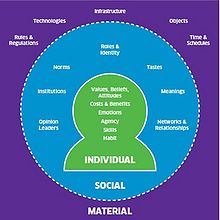ISM Principles of Change
| Line 1: | Line 1: | ||
The ISM - Individual, Social, and Material - model is a multi-disciplinary tool to study the human behavior in the aspects of: behavioral economics, social psychology and sociology [GovScot.]. The model facilitates an integrated, whole-system perspective of the challenges of individuals, organizations, and partnerships. Through the process, stakeholders aim to develop a shared understanding by identifying their respective roles in bringing about change. Hereby, the model draws insight from multiple disciplines to ease the decision-making of complex problems [sustain.]. The result is a shared ownership of solutions. This is a vital part of project management to successfully transferring ownership to operations in all kind of projects [PMI]. | The ISM - Individual, Social, and Material - model is a multi-disciplinary tool to study the human behavior in the aspects of: behavioral economics, social psychology and sociology [GovScot.]. The model facilitates an integrated, whole-system perspective of the challenges of individuals, organizations, and partnerships. Through the process, stakeholders aim to develop a shared understanding by identifying their respective roles in bringing about change. Hereby, the model draws insight from multiple disciplines to ease the decision-making of complex problems [sustain.]. The result is a shared ownership of solutions. This is a vital part of project management to successfully transferring ownership to operations in all kind of projects [PMI]. | ||
| − | + | ||
| + | {{TOC left}} | ||
| + | |||
The ISM tool was developed by researcher Andrew Darnton and launched by the Scottish Government in 2013 to evaluate the impact of sustainability challenges in certain projects [ISM]. Since, it has found use for policy makers and practitioners to influence people's behaviors and bring about change [Govscot.]. | The ISM tool was developed by researcher Andrew Darnton and launched by the Scottish Government in 2013 to evaluate the impact of sustainability challenges in certain projects [ISM]. Since, it has found use for policy makers and practitioners to influence people's behaviors and bring about change [Govscot.]. | ||
Revision as of 15:50, 14 February 2021
The ISM - Individual, Social, and Material - model is a multi-disciplinary tool to study the human behavior in the aspects of: behavioral economics, social psychology and sociology [GovScot.]. The model facilitates an integrated, whole-system perspective of the challenges of individuals, organizations, and partnerships. Through the process, stakeholders aim to develop a shared understanding by identifying their respective roles in bringing about change. Hereby, the model draws insight from multiple disciplines to ease the decision-making of complex problems [sustain.]. The result is a shared ownership of solutions. This is a vital part of project management to successfully transferring ownership to operations in all kind of projects [PMI].
Contents |
The ISM tool was developed by researcher Andrew Darnton and launched by the Scottish Government in 2013 to evaluate the impact of sustainability challenges in certain projects [ISM]. Since, it has found use for policy makers and practitioners to influence people's behaviors and bring about change [Govscot.].
Background
x
The Three Aspects
x
Usage
x
Limitations
x
References
It fosters identification and development of options and shared ownership of solutions, taking account of influences on behaviors and decision-making which ultimately determine the impact of projects and actions.
Further readings: Behavioral economics: Nudge, R. H. Thaler. Social psychology: Influence Science and Practice, R. B. Cialdini. Sociology: The dynamics of social practice, E. Shove.
